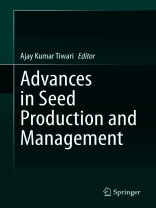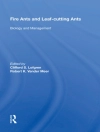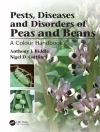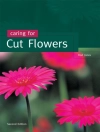High-quality seed is essential for healthy crops and greater agricultural productivity. At the same time, advances in breeding technology require equivalent advances in seed technology. In order to ensure food security, it is crucial to develop seeds that are high yielding, and resistant to drought, heat, cold, and insects.
Gathering the latest research in seed sciences, the book includes contributions on seed production in crops such as legumes, sugar, rice, wheat and other cereals. It discusses a range of topics, like the effect of climate change on seed quality, production and storage; seed rouging; seed certification for different crop species; seed biology; and seed pathologies and their effective management. Integrating basic and applied research, this compendium provides valuable insights for researchers and students in agricultural and life sciences; professionals involved in seed certification and those working in quarantine laboratories; as well as plant pathologists.
Mục lục
Chapter 1: Role of Quarantine in Management of Transboundary Seed-borne Diseases.
– Chapter 2: Application of advanced seed production techniques in sugarcane crop improvement.-
Chapter 3: Agroecological management of stem borers’ for healthy seed production in sugarcane
.- Chapter 4: Sugarcane White Leaf and Grassy Shoot 1 Management For Healthy Seed Production In Vietnam.-
Chapter 5: Vegetable seed production: Prospects and Challenges’, the case of Ghana.-
Chapter 6: Production of High Quality Tropical Forage Legume Seeds.-
Chapter 7: Quality seed production of Sugar beet in India.-
Chapter 8: Seed Infesting Pests And Its Control Strategies.-
Chapter 9: Disease Causing Seed Pathogenic Micro-organisms and Their Management Practices.-
Chapter 10: Weed Management in Sugarcane for quality seed production.-
Chapter 11: Insect Pest Management for Healthy Seed Production.-
Chapter 12: Effect of climate change on Pollination, Fertilization and seed development in agricultural crops.-
Chapter 13: Seed Dormancy.-
Chapter 14: Seed-borne Mycoflora of Edible Oilseed Crops of India.-
Chapter 15: Seed borne Alternaria helianthi leaf blight in Sunflower.-
Chapter 16: Interspecific hybridization among Vigna mungo (L.) Hepper (Black gram) and wild Vigna species.-
Chapter 17: Technological advances in Agronomic practices of seed processing, storage, and pest management-an update.-
Chapter 18: Natural products for the alternative seeds treatment.-
Chapter 19: Advances in big data analytics and applications to seed technology.-
Chapter 20: Seed micro-morphological characteristics in local landraces of finger millet (Eleusine coracana (L.) Gaertn.).-
Chapter 21: Seed Storage and Longevity: MECHANISM, TYPES AND MANAGEMENT.-
Chapter22: Modeling seed germination response to salinity at different accelerated ageing period in canola.-
Chapter 23: Methods of seed enhancement.-
Chapter 24: Seed biotechnology for improvement of staple crops.-
Chapter 25: PRODUCTION OF HEALTHY CANE SEEDLINGS IN THE BRAZILIAN NORTHEAST.-
Chapter 26: Improvement of seed quality; a 1 Biotechnological approach.-
Chapter 27: Organic packages for Seed Production.-
Chapter 28: EFFECTS OF PROHEXADIONE-CALCIUM APPLICATION ON VEGETATIVE AND GENERATIVE GROWTH OF PEPPER PLANTS.-
Chapter 29: BEAN COMMON MOSAIC VIRUS TRANSMISSION BY BEAN SEED cv CHERVONA SHAPOCHKA.-
Chapter 30: SEED BIOLOGY.-
Chapter 31: SEED BORNE DISEASES AND ITS MANAGEMENT.
Giới thiệu về tác giả
Ajay K. Tiwari, Ph D, is a Scientific Officer at the UP Council of Sugarcane Research, Shahjahanpur, UP, India. He completed his Ph D on Cucurbit viruses at the CCS University, Meerut, UP, India, in 2011. He is a member of the British Society of Plant Pathology, Indian Phytopathological Society, Sugarcane Technologists Association of India, International Society of Sugarcane Technologists, Society of Sugarcane Research and Promotion, Prof H. S. Srivastava Foundation, and Society of Plant Research. He has published 75 research articles and 12 review articles in respected national and international journals. He has also published six book chapters and has also authored seven books published by Springer, Taylor & Francis, and Nova. He has submitted more than 200 plant pathogen nucleotide sequences to Genbank.
Dr. Tiwari is a regular reviewer and member of the editorial boards of several international journals, and is managing editor of Sugar Tech (IF 1.08) and chiefeditor of the Agrica journal. He received the CIPAM Young Researcher Award in 2011, and the DST-SERB Young Scientist Award, and was nominated for the Narshiman Award by the Indian Phytopathological Society. He was selected for the Young Scientist Award by the Chief Minister of the State Government of UP for his outstanding contributions in the area of plant pathology, and was the recipient of many international travel awards conferred by DST, DBT, and CSIR in India; PATHOLUX in Luxembourg; and IOM in Brazil. He has attended conferences and workshops China, Italy, Germany, Vietnam and Thailand, and has delivered invited talks on phytoplasma diseases of sugarcane in Vietnam and Thailand. He also received a post-doctoral fellowship from Oman and DST India.
He is currently involved in research on the molecular characterization and management of agricultural plant pathogens, and the production of healthy sugarcane seed materials and their distribution in UP through cane societies.












